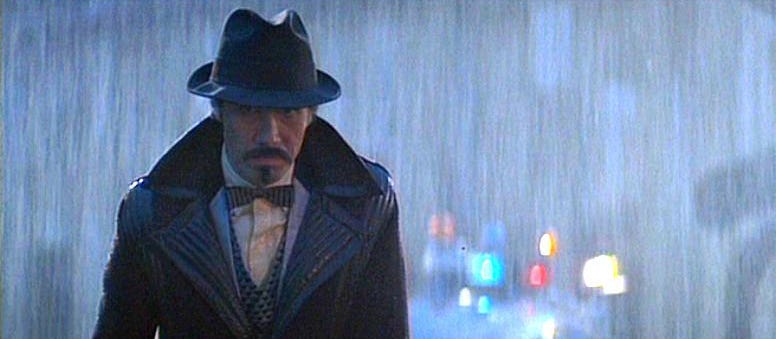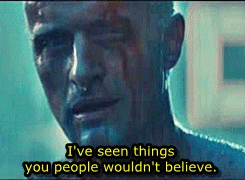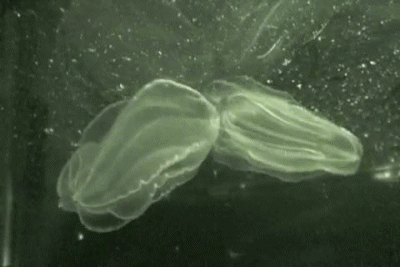Read Do Androids Dream of Electric Sheep
Earlier RE-READING:
Information technology's time to accept some fun! While I greatly enjoyed Iris Murdoch's magnum opus The Sea, The Sea, information technology would be an exaggeration to say that the book entertained, exactly. Edified, perhaps. Aware. But "entertained" comes on too stiff. So I am counting on Philip G. Dick to do me a solid and put the "wheee!" back in "reading."

Yes, I know the picture and the volume barely resemble one some other. (Whatsoever more than than the sure-to-be mediocre movie sequel will resemble the greatness of original. Simply I digress.) And while Bract Runner is perchance my favorite film of all time — I own like 2 DVDs these days, and ane of them is the Blade Runner: The Concluding Cutting — for any reason, I've only read the volume that inspired it all once, some years agone. Worse nevertheless, it was a pirated ebook (sorry, estate of Phillip K. Dick) that I read on my original white Kindle, replete with typographical errors, weird squiggles, and non-real paragraph breaks. Worse still, I read Do Androids Dream of Electrical Sheep? in one sitting while working pretty hard on a canteen of bourbon in a hotel room in a strange town several time zones abroad from dwelling. Thus my comprehension levels were not, shall nosotros say, quite where they ought to have been.
What I call back is a story that reproduced, amplified, and exploded all those sometime noir tropes. Grizzled PI? Check. Just with lasers. Vicious villains? Check. But they're androids. Criminal androids, people. A femme fatale? Check. Just she'due south besides an android.
Perhaps a bigger fan of sci-fi and fantasy than myself doesn't stop upwards so mesmerized past such a sleeky and grim reworking of the old tropes. But they catapulted me into a world where everything sometime was new once again, and I could once more be thrilled with a PI chasing the bad guys downwardly night city streets.
All of which is a roundabout way of proverb that I don't really think much of the book'southward substance. At present, as I discussed last month, that's as well the case with, well, nigh every other volume, I've e'er read, just those were owing to the normal tug and pull of memory and forgetting. Do Androids Dream of Electric Sheep? has persisted in memory in grim disobedience of the obliterating furnishings of alcohol, which makes me wonder, slightly, if I'm not disruptive the moving picture and the volume.
Afterwards all, how many books do you lot recall you could keep concentrating on through an e'er-thickening bourbon brume, and actually terminate? I'd wager 1 in 20. one in fifty, maybe. (Hey, this sounds like a great scientific experiment. Someone about fifteen years younger than me should try information technology out.) About halfway through a canteen of Jim Beam solitary in a hotel room, SportsCenter or whatever dumb movie is playing on TBS offset sounding like cracking options, right after you order in some Domino's. Reading is freakin' hard when you lot're in that state, and I'm not even talking about the function where the words get blurry.
My original idea was to effort to recreate that original reading with a 5th of Jim Beam, simply wisdom precludes that possibility. You don't get in to forty without learning that the hangovers hurt a lot more than they used to, and that with small humans in the firm that depend on you, yous simple aren't allowed to exist bearish and hungover for a whole day following your little fiesta.
Instead, I'm going to plop downward in my favorite reading chair with a glass of homebrewed hard cider. Perchance I'll accept two. If I get lucky — by which I mean, if none of the small humans in the house require care or maintenance and if I can manage to stay awake long enough — I'll end in one sitting again.
Likewise wanting to re-read the book that inspired the fantastical motion-picture show, I'm curious to see if information technology'due south even possible to enjoy a book sober that you lot loved while drinking. Also, this time I've got an actual paper copy, with real pages and correct typography and everything.
What I really hope is that Do Androids Dream of Electric Sheep? proves to be equally hypnotic on a re-read as it was the beginning fourth dimension effectually. Because in this installment I've talked far besides much about bourbon and reading on bourbon, and said almost nothing about the book itself. Time to get that rectified.
Subsequently READING:
I said it once already just damn, Do Androids Dream of Electric Sheep? really is nothing, nothing at all, like the movie. Though inextricably intertwined, the 2 are different plenty that we're not merely talking about two different media, but ii different stories with entirely dissimilar aims. Blade Runner, for all its gritty darkness, exists to entertain, while perhaps doing a fleck of philosophizing along the style,

and poeticizing,

featuring the most fatale-ist of femme fatales.

Do Androids Dream of Electric Sheep?, on the other hand, serves an entirely different purpose. Philip Thou. Dick's oddly lumpy prose weaves a fictive dream strong enough to alter the qualities of your own known globe. Replete with all the set pieces of pulpy science fiction — the flying cars, the laser tube, the weird religion (what the hell is Mercerism all virtually, anyway?) — while twisting and subverting the standard tropes of noir fiction. Read information technology, read it, read it.
"I love you, Rachael said. "If I entered a room and found a sofa covered with your hide I'd score very high on the Voigt-Kampff exam."
The Voigt-Kampff test, of class, is the empathy examination that the Rick Deckard, android hunter (the term "blade runner" appears nowhere in Practise Androids Dream of Electric Sheep?), to determine if his subjects are man or non. The test measures empathy, an emotion androids are incapable of:
"Y'all're reading a novel written in the former days before the war," [Deckard said.] "The characters are visiting Fisherman's Wharf in San Francisco. They become hungry and enter a seafood restaurant. Ane of them orders lobsters, and the chef drops the lobster into the tub of boiling water while the characters watch."
"Oh god," Rachael said. "That's awful! Did they really do that? It's depraved! Yous mean a live lobster?" The gauges, however, did non respond. Formally, a correct response. But simulated.
Rachael, of form, is an android. A Nexus-6 model, to exist precise. The virtually sophisticated android ever designed, yet even so incapable of feeling the fundamentally human emotion of empathy. Simply, Dick asks, can yous love without empathy? The book isn't exactly sure, but it certainly hints at the possibility when Rachael claims to honey Deckard, citing the example of how she'd feel seeing his flayed mankind on brandish.
Later on, Rachael tosses his goat — a real, alive goat, not an android reproduction, very expensive, very rare — from the roof of Deckard'south apartment building, so perhaps she didn't really love him all that much, after all. Or did she simply love likewise much? That'southward only one of the delicious mysteries Exercise Android Dream of Electrical Sheep? leaves for u.s. to ponder.
I'm non a fan of books that bludgeon u.s. with dazzling philosophical insight, cloaked perhaps with a low-cal drizzle of plot frosting.

It'south far, far superior when the plot bubbles the philosophy to the surface, creating seeming paradoxes and blazing insights that force us to re-evaluate what we thought we knew. Take the strange quasi-religion of Mercerism that Dick created, wherein one grips an "empathy box" to commune with a foreign prophet climbing a loma like Sisyphus while rocks are hurled at you. Sort of makes sense, if y'all think about information technology. Afterward all, what would a post-apocalyptic world need to heal? The opposite of what brought on the apocalypse in the first identify: human being empathy.
All this makes you wonder, are we actually so dissimilar from the androids? Aren't we just thinking boxes that seem to experience empathy? How oft do we really, truly walk a mile in someone else'due south shoes? Practise nosotros ever really connect with our fellows? Maybe nosotros merely beam signals at each other from our respective solipsistic ships, responding to elaborate stimuli in an ever-more intricate trip the light fantastic toe?
Exercise Androids Dream of Electric Sheep? does offer a fractional answer to these questions: in the end, what trips the androids upwardly, despite their superhuman force and intelligence, is that they can't care near one some other. Deckard knows this, and hunts them down one past one. He murders them without mercy and uses his bounty to buy a real, alive goat. Which, equally yous know, the android that says she loves him proceeds to impale. (What a strange, magnificent plot!)
Then, the book closes not with his successful android hunt, only with a Jesus-like pilgrimage into the post-war wasteland of northern California. But unlike Jesus or the saints, Deckard attains no swell insight in the desert. All he finds is a toad. Which would be a remarkable notice in a world where nearly all wild species take been killed off, except the toad, likewise, turns out to exist an android. The world snaps shut on us all in the finish.
Which, I recollect, is only what makes Practise Androids Dream of Electric Sheep? so mesmerizing. Its self-referential circle swallows itself whole; you lot tin't accept the globe it creates without accepting the world you're in.

And if that sounds a touch too precious, like a Zen koan painted on a child'due south woodblock from Pottery Befouled on the drape over your peachy-aunt's fireplace, I tin can but say that's because I'm no Philip K. Dick. I cannot quite describe the abracadabra by which he achieves his effects. This was true when I read the book while quaffing bourbon on a difficult hotel chair; it'southward true while I read it stone-cold sober in my favorite easy chair. Once I started, I couldn't even drag myself over to the fridge to cascade myself a difficult cider.
Hoary every bit it seems to say it, Philip K. Dick is inviting united states to consider the nature of existence homo. To become back to Rachael's formally correct just fake respond well-nigh the boiling lobster. If being human really ways to empathize with the suffering of others, then how can we eddy lobster alive to enjoy as a delicious, if high-maintenance, dinner?
In college I worked in a Cajun restaurant. Every year around Mardi Gras nosotros'd go far a huge shipment of live crawdads (I don't care if they phone call them "crawfish" in Louisiana; where I come from, they're crawdads). Once I watched the chef driblet vats of alive crawdads into boiling water. They made a horrific squealing sound when they got dumped in. "Just the shells cooking," the chef said. I wasn't so sure it wasn't a chorus of pain, merely all the same, it'south not similar I intervened. In fact, I don't retrieve feeling even the slightest twitch of empathy.
And yet, no one who wasn't a serial killer would toss a puppy into a boiling pot. As humans we reply to a puppy'due south face, information technology's big black eyes and yelps. Lobsters look like fishy bugs with no feelings. Fifty-fifty though recent research indicates that information technology's highly likely that lobsters (and presumably crawdads) practise feel hurting, we eat them anyhow. Meanwhile, puppies whimper and lick our hands and nosotros give them names. Similar Denis Leary once suggested, nosotros should just line all the animals up for auditions. The otters, who swim around and practise cute picayune human being things with their hands, go a pass. The cows, who make baseball game gloves and hamburgers, go to the abattoir.

Information technology all comes back to the sometime Buddhist dodge — even though the Buddha forbade the killing and eating of living creatures, Buddhists everywhere chow downwards on dead animals. As whatsoever skillful Buddhist will tell you, it'due south okay, because someone else did the killing.
Not that I'm picking on Buddhists. Nosotros all exercise it, one manner or another. There'd exist no civilization if we didn't. Humans are natural built-in killers similar the tiger or great white shark. We've just learned to farm the messy parts out to other people and, at times, machinery.
But Philip K. Dick is over here in the corner, reminding united states that to be human is to feel empathy.
If selectively.
DOG-EAR Written report:
Tin can't set the scene much better than this:
In a giant, empty, decaying building which had one time housed thousands, a unmarried Idiot box ready hawked its wares to an uninhabited room.
Philip G. Dick is a master of the small-scale item that signals we're in a majorly unlike earth. For example, in this scene, when Deckard finally has the femme fatale alone in a hotel room. Does he bend down to kiss her? Yes, but:
Bending, he kissed her bare shoulder.
Why her shoulder instead of her lips? I don't know, but it works to perfection. And this is why you and I are you and I, and he's Philip K. Dick.
I bet this is the line Rutger Hauer read over and over once again, preparing for his function as Roy Baty in the picture version:
Roy Baty entered, somber and big, smiling his crooked tuneless smile.
Next: An old story by a new star.

Source: https://electricliterature.com/my-year-in-re-reading-after-40-do-androids-dream-of-electric-sheep/
0 Response to "Read Do Androids Dream of Electric Sheep"
Post a Comment